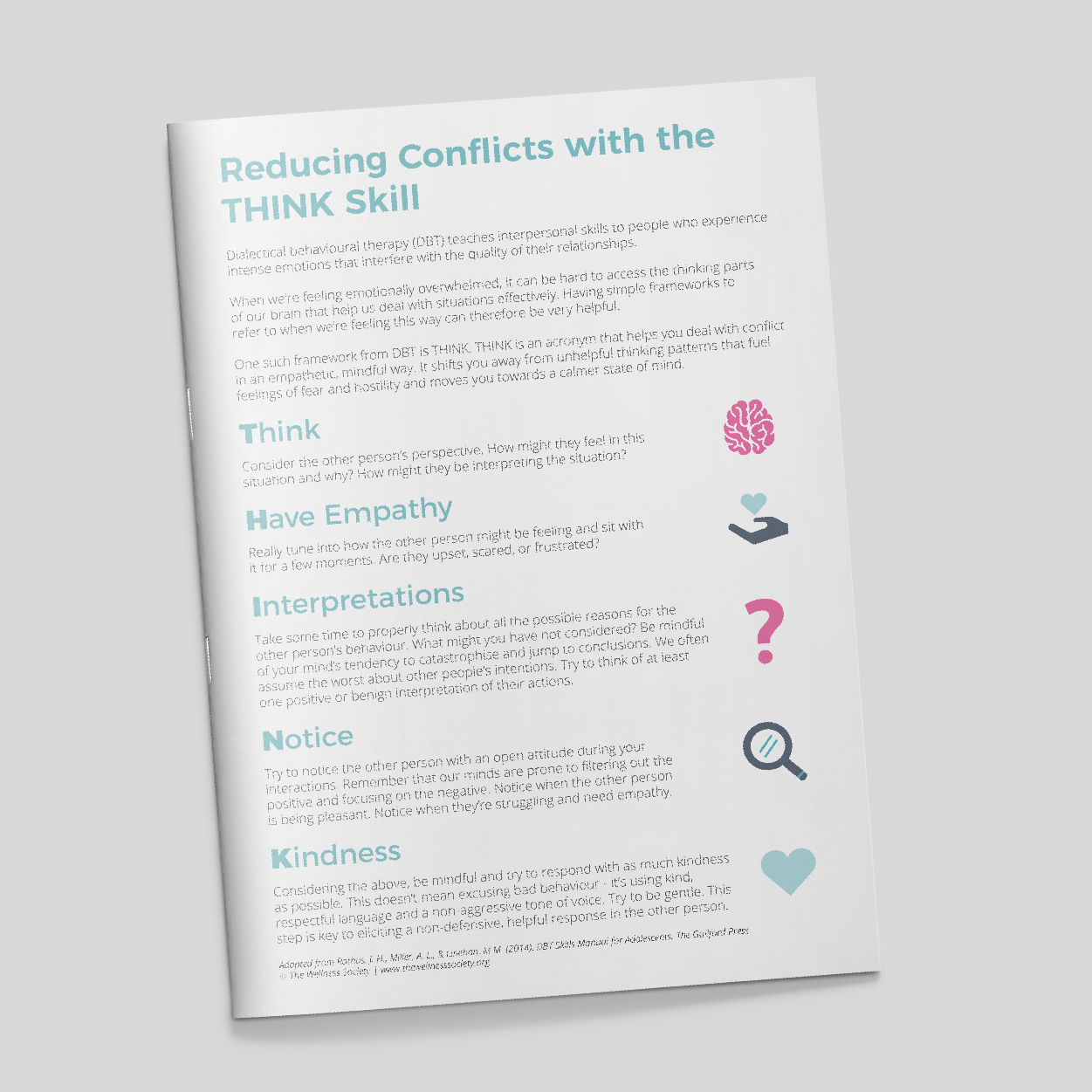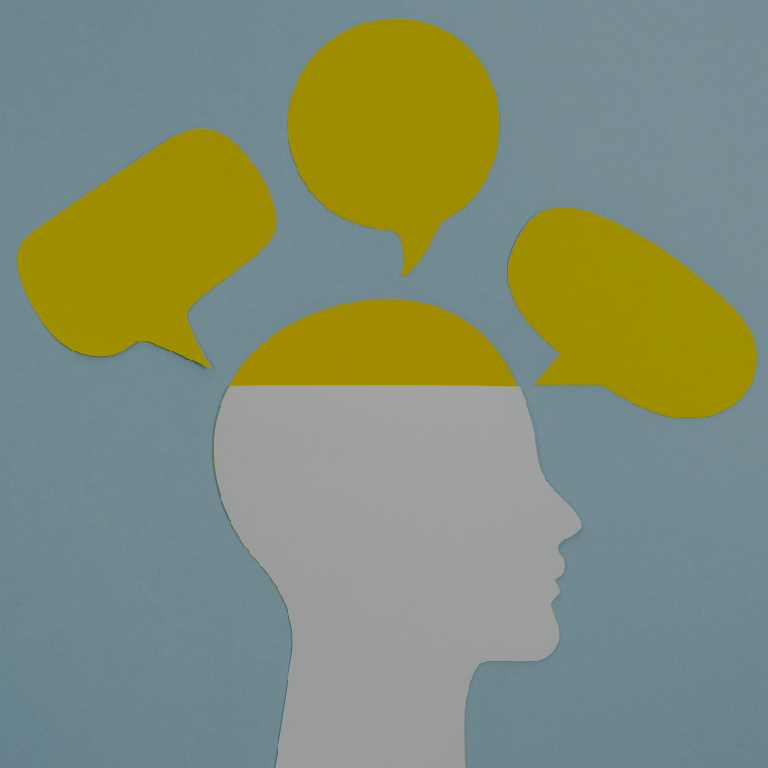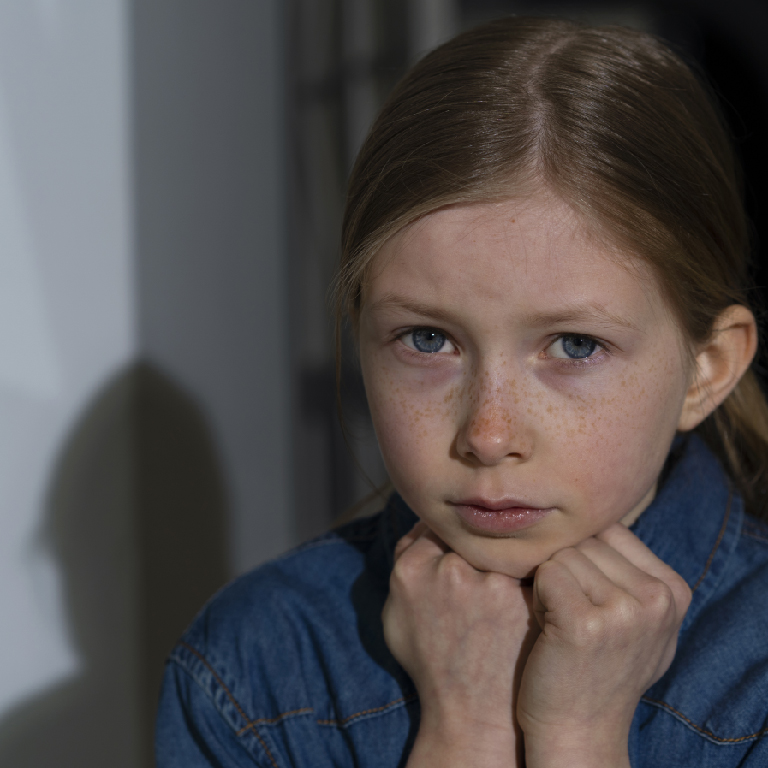If you’ve read “CBT” or “DBT” on a therapist’s profile or website and wondered what the letters stand for, you’ve come to the right place!
In this article, you’ll find out what CBT and DBT are, the differences and similarities between them, and criticisms of each.
What is CBT?
CBT stands for Cognitive Behavioral Therapy. Many therapists use CBT because it’s evidence-based practice, meaning research has shown it works.
The primary idea behind CBT is that our thoughts, feelings, and behaviors all influence each other. If you change one element in the thought/feeling/behavior triangle, CBT stipulates that the other two elements will change as well.
CBT is most well-known for changing people’s thoughts, but CBT clinicians may also help clients change their feelings and behaviors as well.
How Does CBT Work?
CBT uses a few tools to change clients’ thoughts, and one such tool is a list of cognitive distortions.
Cognitive distortions are mind traps or tricks. Everyone experiences them sometimes, and they can make your mood worse. A good therapist will help you differentiate between rational thoughts and fears, and unhelpful cognitive distortions.
You can download a free short book outlining the CBT framework using the form below.
Another tool CBT clinicians often use are thought logs. Thought logs are structured journal entries designed to help people identify cognitive distortions and cope appropriately. Here are the steps thought logs typically incorporate:
- Note down the situation.
- Write down your distressing thoughts
- Which emotions the thoughts are triggering?
- What are some alternative thoughts?
- Return to #’s 2 and 3. Has your beliefs in the thoughts and emotions around them decreased significantly? If not, return to #4 and keep writing until they do.
Depending on the therapists’ and clients’ preferences, clients may complete thought logs during therapy sessions, or outside of sessions as therapy “homework.”
A thought log worksheet is included in The Mental Wellbeing Toolkit.
What is DBT?
Dialectical Behavioral Therapy, or DBT, was created by acclaimed therapist Marsha Linehan.
DBT is a set of mental health skills based on CBT and mindfulness concepts. Many of DBT’s tools are designed to help people change their thoughts, feelings, and/or behaviors, which is the basis of CBT.
There are four modules to DBT:
- Mindfulness
- Emotion Regulation
- Interpersonal Effectiveness
- Distress Tolerance
Mindfulness is the practice of being in the present moment intentionally and non-judgmentally (paraphrased from Jon Kabat-Zinn’s definition). Mindfulness is often taught as the first and seen as the most important module in DBT.
The Emotion Regulation module teaches clients skills to understand and take control of their feelings.
The Interpersonal Effectiveness module tells clients how to make and keep healthy relationships, and work on or end unhealthy relationships. You can download a free THINK Skill DBT Worksheet from this module from our Free Tools Library.
Last but not least, Distress Tolerance helps clients survive intense emotions and crisis situations. Distress Tolerance skills are ideally only used when in an emotional crisis, and no other DBT skills are working.
CBT vs DBT: How Are They Different?
First, DBT incorporates CBT concepts and skills.
CBT is a part of DBT, but not the other way around.
Second, CBT can be completed in individual therapy. True DBT requires individual as well as group sessions.
Typically, the group sessions are focused on learning the curriculum, so that individual sessions can be used for applying the skills, as well as processing emotions and traumas.
With all of that said, many therapists do use DBT skills and concepts in individual therapy, even with clients who aren’t in a DBT program.
Third, CBT is recommended for all types of folks who come to therapy with all types of presenting problems.
A DBT program, on the other hand, is typically recommended for people for whom once weekly therapy is not enough to help them effectively reach their therapy goals. People diagnosed with chronic moderate to severe depression, Borderline Personality Disorder, Bipolar Disorder, eating disorders, substance use disorders, and trauma disorders may benefit more from DBT than CBT.
Criticism of CBT and DBT
No therapy methodology works for everyone, and CBT and DBT are no exception.
Some folks have criticized CBT for being misused by therapists to deny people’s legitimate experiences or pain.
DBT has been criticized for co-opting Eastern philosophies and religions that have existed for centuries.
If you’re concerned about these or other criticisms of CBT and/or DBT, please speak to your therapist about them.
Finding a CBT or DBT Therapist
If you’re interested in pursuing CBT or DBT to help you with your mental health, talk to a therapist who specializes in the modality.
Remember that the most important factor resulting in progress in therapy is a good relationship with your therapist.
Green Flags (signs a therapist may be a good fit):
- If you are nervous starting the session, you feel less nervous as it goes on.
- The therapist is a good listener.
- You’re comfortable with the amount the therapist shares about themselves and their life.
- After therapy, you feel glad you went, and hopeful about the future.
- The therapist encourages you to go outside your comfort zone, but not too far to the point that it would be re-traumatizing.
Red Flags (signs a therapist may not be right for you):
- It seems like the therapist is distracted or not really listening.
- You feel judged or invalidated by the therapist.
- After therapy, you feel worse about yourself or your choices.
- The therapist shares more about themselves than you are comfortable hearing.
- They ask you to spend time with them outside of therapy sessions, buy you gifts, or make sexual advances (these things rarely happen, and are a major violation of ethical codes).
Self-Guided Support
Research shows that self-help materials are often enough for people to overcome mild to moderate mental health difficulties without professional support.
If you’re interested in a self-guided program that includes tools from both CBT and DBT, be sure to check out The Mental Wellbeing Toolkit.

About Rebecca
Rebecca Ogle, LCSW, is a Licensed Clinical Social worker and therapist in Chicago, IL.Rebecca provides therapy to people with anxiety, low self-esteem, and people pleasing tendencies. She uses a feminist and social justice lens, and interventions based in CBT, mindfulness, and motivational interviewing.
For helpful, free content, follow her on Instagram or go to her website.




